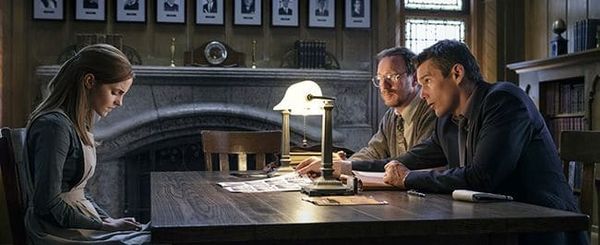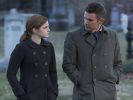Eye For Film >> Movies >> Regression (2015) Film Review
Regression
Reviewed by: Amber Wilkinson

Sometimes a retro vibe can be a positive thing, recalling past joys and celebrating or playing around with them. And sometimes, it just means been there, done that. Alejandro Amenabar's odd attempt at mixing art house ideas with genre cinema - which opened San Sebastian Film Festival - falls into the latter category. Even the subject matter feels like the day before yesterday's news. It focuses on the idea of false memory and mass hysteria taking hold of a community, drawing real-life inspiration from the wave of belief in satanic ritual abuse that swept through the US in the 80s and 90s (although British viewers are just as likely to recall the media storms in Rochdale and Orkney).
Ethan Hawke, who suddenly seems to be morphing into Richard Gere, plays brash small town detective Bruce Kenner, a hard-boiled no-nonsense sort who finds himself investigating after 17-year-old Angela Watson flees her family home for the local church and writes a letter accusing her father of abuse. When her God-fearing dad (David Denick) turns up at the station, he says he can't remember committing the abuse but that he must have done it because Angela says so. Somehow into this situation comes David Thewlis's Professor Kenneth Raines, although why a Lancashire psychologist would find themselves in backwater Minnesota is anyone's guess. He has a metronome and a plan to use regression therapy to help Angela and her dad remember what happened - leading to memories of witchy nastiness and baby slaughter.

Although a non-believer, Kenner begins to find himself consumed by listening to the recordings of the memories and starts to experience some odd events himself, especially up at the Angela's family home, where her gran Rose (Dale Dickey, playing the scatty horror tropes up to the hilt) holds sway.
Try as he might Amenabar fails to generate suspense because he has already undercut his argument. By setting up the idea of mass hysteria from the outset he makes it very hard for an audience to try to buy in, as Bruce does, to the idea of real abuse going on. Also, the horror scenes, though well shot, feel like off-cuts from early Eighties B horror, and there's little shock value in the familiar. Amenabar is hamstrung by the fact that he is forced to draw on cliche while at the same time needing to break free from it if he is to inject any tension from his tale. Hawke and Thewlis do what they can with the hokum but Watson is given little to do but look forlorn. The fallback position is cinematographer Daniel Aranyo's good looking portentousness, with Se7en-style quantities of rain, swinging barn doors and unnecessary walks in the cemetery while crows caw on cue. Also, in a frankly bizarre piece of decision making, all the female characters seem to favour Salem Witch Trial chic - think home knits and drab pinafore dresses - despite this being allegedly set in 1990 when ripped jeans and blasts of colour held sway. Amenabar would need to regress his audience back to the early Eighties for this to have any sort of suspense.
Reviewed on: 21 Sep 2015

















